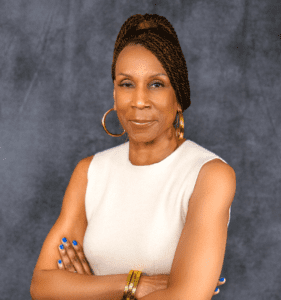
“It is really important that you, as a leader, understand that your role is to inspire and motivate. It’s not about what it is you do, but how you do it. You have to get outside of yourself and recognize that the true measure of success is not about what you did, but how you led others to their full potential.”
—Jerri DeVard, CEO and Founder of the Black Executive CMO Alliance (BECA)
With a career spanning 40 years of marketing and leadership experience at large global brands—from Chief Customer Officer at Office Depot to CMO at ADT Corporation to SVP at Verizon Communications—Jerri DeVard has learned a thing or two about executive leadership. On the heels of her most recent accolade as a 2024 American Advertising Federation Hall of Fame inductee, she shared her thoughts with us on mentorship, the status of Black representation in the marketing industry, the importance of influencer and creator marketing, and what makes a successful CMO today.
Chief Marketer: How did the mentors you’ve had contribute to advancing your career? What did you learn from them?

Jerri DeVard, CEO and Founder of the Black Executive CMO Alliance: I’ve had the fortune of having great mentors—people who really cared about me and helped me when I was struggling, or when I had a challenge. My best mentor was a gentleman by the name of Bruce Gordon. Bruce was my boss when I was at Verizon. And what I learned from him was the opportunity to have a big mandate and bring others along with you… That it wasn’t just about what you thought, but you needed to know how the organization felt about what you thought… the idea of sitting down with people and hearing what they wanted, and that the agenda that you had was only to make the organization successful.
I also think about the importance of followership. And Bruce was someone who people followed from the mailroom to the boardroom. I watched him in big crowds and small crowds. I was with him when the crowds weren’t there and heard what he said and how he talked about it, and how important it was for the organization to succeed with people—not through people—and understanding the role that they played. That was really important to me.
CM: As founder of the Black Executive CMO Alliance, how would you rate the progress of Black representation in marketing today?
JD: BECA was created with C-suite Black executives from Fortune 500 companies, and it was around this issue of improving representation—the representation, the inclusion and the progress of Black marketers. We are not making the progress that we need to make. The numbers are stubbornly low; we are still hearing that. We believe that the issue of representation is not around supply, but demand—that companies and individuals are looking in the same places.
So, BECA looks at this from a standpoint of saying, if there’s not enough progress, what can be done? We’re the people that are going to do something about this. We’re going to start to look to improve what the performance is amongst mid-level African Americans in organizations. So we can unpack those unwritten rules of what it takes to be successful. To be a BECA member, you have to be the top marketer in your organization. You can’t report to someone else that has that market. We created four key pillars that were very important that we would come together to share, to learn, to elevate and to pay it forward.
The sharing was about, how do we share with each other the things that we’re going through, the agencies that we have, the people that we have, the organizational structure that we need, the partners, the third parties, the products, the services—so we could share and learn from each other on that. But the most important pillar was about paying it forward. Because that fourth pillar was about legacy and generational learning. How do I pour into someone so that they can get to where they need to be faster, and where they can also be able to replicate that for others? The progress of this industry is stubbornly resistant to change, but we are trying to, and attempting to amplify and multiply the success by the roles that we do collectively, by the impact that we have collectively.
CM: Throughout your career in marketing, what you have found to be the most important aspects about leadership?
JD: The leadership qualities differ depending upon what functional area you’re in. So, marketers represent the voice of the customer or the consumer. And many people feel that a lot of what we do is subjective as opposed to objective—even though we have a lot of data around what is needed. I always say that marketers have to be able to be humble. You have to check your ego at the door. You have to be able to listen, and you have to be able to understand who and where the feedback is coming from. So when you think about what it takes, the first one is humility. When you walk in the door and you feel that you’ve got all the right answers, that’s never a successful strategy. You have to be able to take in different viewpoints, much like you take in the voices of your target customers.
The second thing is that you have to have an ability to bring a perspective that understands the organization’s desire. Do you understand how your company makes money, the customers and consumers that you want to be able to consume your product, and the ones that you aren’t right for? You can’t be all things to all people. And are you clear about what it is you are offering and how to do that better than your competition? There are very few unique products in the world. And so what you have to do as a great marketer is tease out your reason for being, in a credible, sustainable way.
CM: What are the trends that you think marketers should be paying attention to right now? I’m guessing one might be AI.
JD: I’m glad you said that, because obviously generative AI is the answer that everyone’s going to give you. But there are a couple more things that marketers should be thinking about. The first one is the creator economy. Some people still aren’t apportioning enough of their budget to have creators that can authentically tell stories that you can’t, that you’ll never be able to get to—that distillation of what makes this creator so relevant to their customers, to their followers, that can bring you along. So it’s understanding how much you’re spending, how much credibility you have with different audiences, and allowing other people [to do that for you].
The second thing is that generative AI is not the biggest issue plaguing our industry. It is a lack of inclusion. It is a lack of representation. Because you are only as strong as the people on your team that bring the perspective that they understand and live every single day. And if you are in a monolithic culture organization where everyone thinks the same and it’s an echo chamber, you’re not getting the beauty of lived experiences outside of yours.
And so, it’s focusing on: what does your team look like? Who do I have that is bringing me stories and evidence and products and services that are going to allow me to broaden how I think and make me a little uncomfortable about where I’m going to go? Not to the point that I’m risking it all, but I’m risking what my boundaries are around and what it’s going to take to be successful. Because we all know stories of people that risk too much. In my career I’ve always set aside money to test and learn—money where I wasn’t quite sure what the ROI was going to be, but it was an interesting enough idea that I needed to go out and test it so that I could come back with the evidence and the data that it worked.
Because I’ve learned more from my failures than any of my successes, and my testable failures were at a point where I could use that learning, that insight, to make the next thing I did better. So I think the opportunity is understanding what the creator economy is and shifting more of your money there, recognizing the bench that you have internally and externally, and being committed to changing that. And then being able to really transform your organization and your thinking through innovation, through test-and-learn opportunities, where you can understand what the value is of something that you haven’t done before.
CM: What do you think makes a successful CMO in today’s business climate?
JD: It is really important that you as a leader understand that your role is to inspire and motivate. It’s not about what it is you do, but how you do it… It is really important as a leader, when you’re standing up and representing so many people’s lives. These are people whose families know your name, know what you did, how you lead, the impact that you have on that. And so you really have to take that seriously, and you have to get outside of yourself and recognize that the true measure of success is not about what you did, but how you led others to their full potential—and stepping back and allowing them to shine.






